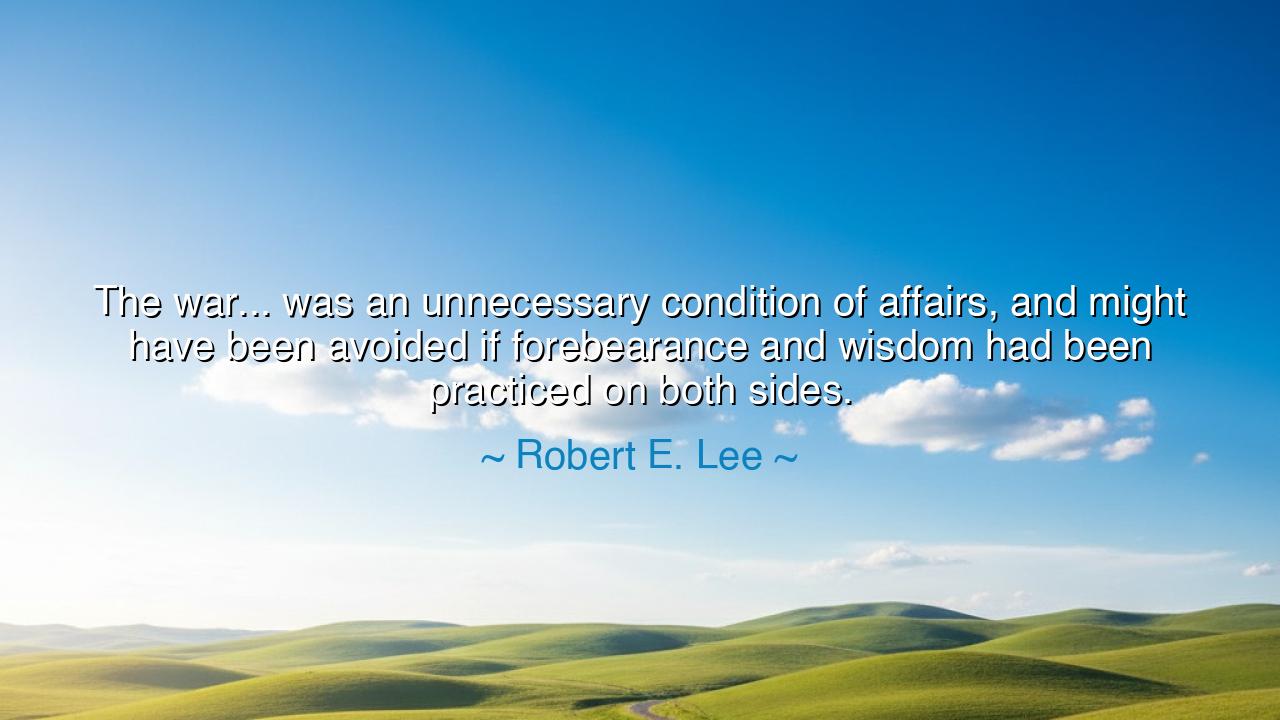
The war... was an unnecessary condition of affairs, and might
The war... was an unnecessary condition of affairs, and might have been avoided if forebearance and wisdom had been practiced on both sides.






Robert E. Lee, the general who bore the terrible burden of leading men in one of the bloodiest conflicts in history, once said: “The war... was an unnecessary condition of affairs, and might have been avoided if forbearance and wisdom had been practiced on both sides.” In these words, we hear not the voice of triumph, but of lament — a soldier who saw victory and defeat alike swallowed in the same ocean of sorrow. His reflection is not about strategy or honor, but about the tragic truth that the Civil War, which claimed hundreds of thousands of lives, could have been averted had humility and patience been chosen over pride and stubbornness.
Lee’s judgment rests on the recognition that conflicts rarely arise from necessity alone. They are often born of misunderstanding, hardened by arrogance, and inflamed by passions that could have been tempered. Forbearance, that ancient virtue of restraint and patience, was absent as North and South drifted toward confrontation. Wisdom, which counsels compromise and foresight, was drowned out by anger, ambition, and the clamor of voices unwilling to yield. Lee’s words remind us that the calamity of civil strife is not destiny, but choice — a choice made again and again until the path of peace is closed.
The Civil War itself bears witness to this truth. Before the first shot was fired at Fort Sumter, there were countless moments when dialogue might have prevailed: debates in Congress, compromises proposed, voices calling for reconciliation. Yet mistrust deepened, extremism flourished, and both sides hardened their hearts. The result was four years of slaughter, cities in ashes, families torn apart, and a nation left scarred for generations. Lee, who commanded armies with brilliance, confessed that the true tragedy was that the war need not have been fought at all.
History provides other examples of this sorrow. Consider the Great War of 1914, when European nations, entangled in alliances and inflamed by pride, plunged into catastrophe. Assassination was the spark, but forbearance might have kept the fire from spreading. Wisdom might have counseled restraint, dialogue, or delay. Instead, within weeks, millions marched to their deaths, and an entire generation was lost. As with America’s Civil War, it was not necessity but folly that opened the gates of destruction.
Lee’s reflection holds a deeper meaning: that in every conflict, no matter how justified one side believes itself to be, there exists the possibility of prevention through humility and reason. When both parties cling to pride, the abyss opens. When even one side embraces forbearance and wisdom, there is hope. To recognize this is to see that the greatest victories are not won on the battlefield, but in the council chamber, in the willingness to sacrifice pride for peace, and in the courage to choose patience over violence.
The lesson for us, then, is timeless. In our homes, in our communities, in our nations, we must not wait for conflicts to harden into inevitability. Practice forbearance: pause before anger, listen before speaking, yield before pride consumes reason. Seek wisdom: look beyond the moment, consider the cost, value peace above fleeting triumph. For once the drums of war begin, whether in families or nations, the suffering that follows often proves far greater than the cause that began it.
Therefore, beloved, let Lee’s lament be a guiding torch. Do not let passion blind you, nor pride lead you into strife that might have been avoided. Let your life be marked by patience in dispute, gentleness in judgment, and courage in reconciliation. For if forbearance and wisdom are practiced, many wars of every kind — great and small — may yet be prevented, and the world spared the sorrow of unnecessary destruction.






DTPham Duy Tuong
Lee’s reflection suggests that wars are not just inevitable forces of nature—they are the result of poor decision-making and a lack of patience. What would it have taken for both sides to practice the forebearance and wisdom he speaks of? Can we apply this same principle to conflicts happening in the world today? How often do we fail to see that wisdom, not force, is the true path to resolution?
GHNguyen Tran Gia Huy
It’s hard not to feel the weight of Lee’s words. The idea that wars could be avoided through wisdom and restraint is both hopeful and tragic. How often have we found ourselves or our leaders in situations where a little more patience, dialogue, or understanding could have prevented devastation? What does this quote say about the importance of listening to one another in moments of tension?
Nnani
Lee’s perspective feels almost like a cautionary tale. In hindsight, it’s easy to see where the opportunity for peace was lost. But in the heat of the moment, how often do we fail to see the bigger picture? This quote challenges us to consider whether the wars we fight today could also be avoided with greater forethought and restraint. Are we making the same mistakes as those who came before us?
LVLinh Vo
This quote raises a fundamental question about human nature—why do we often rush into conflict when there are other paths available? Lee’s reflection on wisdom and forebearance makes me think about how we handle disagreements on a personal and political level. Could better communication and patience truly have prevented the war he refers to, or was the conflict inevitable due to deeper issues at play?
TKLe the khai
Lee’s words seem to emphasize the importance of diplomacy and understanding in avoiding conflict. How many wars could have been prevented if cooler heads had prevailed? It makes me wonder if our modern leaders are failing in the same way by not practicing forebearance and wisdom. Is it possible for nations to truly learn from history, or are we destined to repeat the same mistakes?